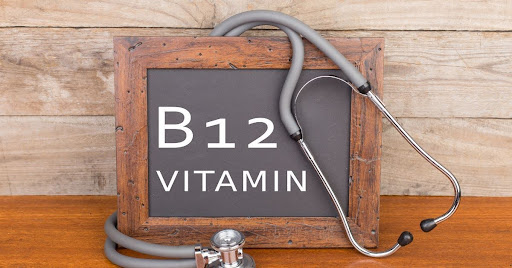Vitamin B12 Deficiency: Symptoms, Testing Methods, and At-Home Solutions
5 min read
By DocGenie , Published on - 08 December 2024
Vitamin B12, also known as cobalamin, is a water-soluble vitamin essential for red blood cell formation, neurological function, and DNA synthesis. Deficiency in this crucial nutrient can lead to a wide range of symptoms, from fatigue and brain fog to irreversible nerve damage if left untreated. This blog explores everything you need to know about Vitamin B12 deficiency—its symptoms, how to test for it (including at-home options), and the best solutions for managing and preventing it.
Why Is Vitamin B12 Important?
 Vitamin B12 plays several key roles in the body:
Vitamin B12 plays several key roles in the body:- Supports red blood cell production and prevents megaloblastic anemia.
- Aids neurological function, including memory and focus.
- Helps in DNA synthesis, ensuring healthy cell division and function.
- Boosts energy levels by aiding metabolism.
Common Symptoms of Vitamin B12 Deficiency
 B12 deficiency can manifest in subtle ways initially, but over time, it may lead to more severe complications. Below are the most commonly reported symptoms:
B12 deficiency can manifest in subtle ways initially, but over time, it may lead to more severe complications. Below are the most commonly reported symptoms:- Fatigue and Weakness Low B12 impairs red blood cell production, resulting in reduced oxygen supply to tissues, which causes chronic fatigue and weakness.
- Tingling and Numbness A lack of B12 can damage the myelin sheath protecting nerves, causing tingling, numbness, or a "pins and needles" sensation, especially in the hands and feet.
- Cognitive Impairment Vitamin B12 deficiency may contribute to memory issues, difficulty concentrating, brain fog, or even early signs of dementia.
- Pale or Jaundiced Skin A shortage of B12 affects red blood cell production, leading to pale or yellowish skin (jaundice).
- Mood Changes and Depression B12 is essential for synthesizing neurotransmitters like serotonin and dopamine. Deficiency has been linked with mood swings, irritability, and depression.
- Glossitis and Mouth Ulcers Inflamed tongue (glossitis), mouth sores, or a burning sensation in the mouth are tell-tale oral signs of deficiency.
- Shortness of Breath and Dizziness Due to anemia caused by B12 deficiency, oxygen transportation is compromised, leading to breathlessness and dizziness during physical activity.
What Causes Vitamin B12 Deficiency?
Understanding the root causes can help with better prevention and treatment. Major causes include:- Inadequate Dietary Intake People following vegan or vegetarian diets are at higher risk, as B12 is mostly found in animal products like meat, eggs, and dairy.
- Poor Absorption Even if dietary intake is sufficient, conditions like pernicious anemia, celiac disease, Crohn’s disease, or atrophic gastritis can impair absorption.
- Medications Prolonged use of certain medications, such as metformin (for diabetes) and proton pump inhibitors (PPIs), can interfere with B12 absorption.
- Aging With age, stomach acid production decreases, reducing the body's ability to absorb B12 effectively.
How to Test for Vitamin B12 Deficiency
Timely diagnosis is crucial. Here are several methods to assess your B12 status:- Serum B12 Test This is the most common blood test to determine the amount of B12 in your bloodstream. However, it may not always reflect your functional B12 status accurately.
- Methylmalonic Acid (MMA) Test This test is more specific than the serum B12 test. Elevated MMA levels indicate a functional deficiency of B12 at the cellular level.
- Homocysteine Test A high level of homocysteine may also suggest B12 deficiency, though it can be influenced by folate and vitamin B6 status too.
- Complete Blood Count (CBC) A CBC can help detect macrocytic anemia, often associated with B12 deficiency.
Can You Test for Vitamin B12 Deficiency at Home?
Yes. At-home B12 testing kits are now widely available. These usually involve:- Finger-prick blood samples, mailed to a certified lab.
- Digital result reports, often within 5–7 business days.
- Some kits even include MMA or homocysteine testing for a more detailed evaluation.
- At-home kits are a convenient option if you want to monitor your levels regularly or are unable to visit a lab easily.
Effective Treatment Options
Once diagnosed, Vitamin B12 deficiency can be managed effectively through various methods:- Oral Supplements For mild deficiencies or people with dietary restrictions, over-the-counter B12 supplements (cyanocobalamin or methylcobalamin) can restore levels within weeks.
- Dosage: Typically ranges from 500 mcg to 1,000 mcg daily.
- Form: Tablets, sublingual drops, or sprays.
- Intramuscular Injections For individuals with severe deficiencies or absorption issues, B12 injections may be necessary.
- Dosage Schedule: Initial daily or weekly shots, followed by monthly maintenance doses.
- Nasal Gels or Sprays These are newer alternatives for individuals who prefer non-invasive options and cannot tolerate oral forms.
- Dietary Improvements Incorporating more B12-rich foods is essential, especially for those with borderline deficiency:
| Food Source | Vitamin B12 Content (per 100g) |
|---|---|
| Beef liver | 70–85 mcg |
| Clams | 84 mcg |
| Eggs | 1.1 mcg |
| Milk and cheese | 0.9–2.4 mcg |
| Fortified cereals | 6 mcg or more |
Can Vitamin B12 Deficiency Be Reversed?
Yes most cases of B12 deficiency are reversible, particularly if caught early. Symptoms like fatigue and brain fog often begin to improve within a few days to weeks of treatment. However, nerve damage caused by prolonged deficiency may be irreversible.How to Prevent Vitamin B12 Deficiency
- Routine Screening Those at risk—such as vegetarians, the elderly, or individuals with gastrointestinal disorders—should test their B12 levels annually.
- Dietary Awareness Include B12-rich or fortified foods regularly, especially if you are cutting down on meat and dairy.
- Supplementation Daily supplements are a safe and affordable way to maintain adequate levels, especially in vulnerable groups.
- Medical Monitoring If you're on medications like metformin or PPIs, discuss with your doctor about monitoring B12 as part of your routine care.
When to See a Doctor
Seek medical advice if you notice symptoms like:- Persistent fatigue or weakness
- Memory lapses or difficulty concentrating
- Tingling or numbness
- Unexplained mood changes or irritability
Early diagnosis and intervention can help prevent long-term complications.



